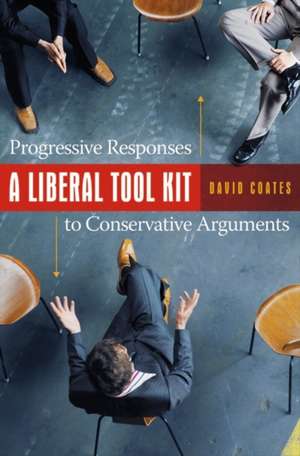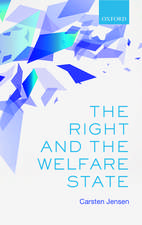A Liberal Tool Kit: Progressive Responses to Conservative Arguments
Autor David Coatesen Limba Engleză Hardback – 29 iul 2007 – vârsta până la 17 ani
Preț: 461.28 lei
Preț vechi: 608.56 lei
-24% Nou
Puncte Express: 692
Preț estimativ în valută:
88.28€ • 95.86$ • 74.15£
88.28€ • 95.86$ • 74.15£
Carte tipărită la comandă
Livrare economică 22 aprilie-06 mai
Preluare comenzi: 021 569.72.76
Specificații
ISBN-13: 9780275998660
ISBN-10: 0275998665
Pagini: 216
Dimensiuni: 156 x 235 x 23 mm
Greutate: 0.48 kg
Editura: Bloomsbury Publishing
Colecția Praeger
Locul publicării:New York, United States
ISBN-10: 0275998665
Pagini: 216
Dimensiuni: 156 x 235 x 23 mm
Greutate: 0.48 kg
Editura: Bloomsbury Publishing
Colecția Praeger
Locul publicării:New York, United States
Notă biografică
David Coates is Worrell Professor of Anglo-American Studies at Wake Forest University. He was previously Professor and Director of the International Center for Labor Studies at the University of Manchester. He has written extensively on contemporary political economy, the war on terrorism, and the politics of labor. His previous books include Prolonged Labour: The Slow Birth of New Labour Britain (2005), Blair's War (2004) with Joel Krieger, and Models of Capitalism (2000).
Recenzii
Coates seeks to provide liberal activists with sound policy arguments on eight issues: trickle-down economics, welfare, social security reform, health care, immigration, religion, the war in Iraq, and economic prosperity. A distinctive feature of the book is that each chapter opens with a summary of the conservative arguments the author seeks to refute. These summaries are well documented, and Coates makes an effort to state his opponents' views accurately, although he does tend to showcase the far Right rather than a more moderate conservative position. He then replies to these arguments with a thoroughly researched presentation of a liberal view. As the title suggests, the aim is to help liberals argue successfully, rather than to win over moderates or conservatives. Consequently, Coates is able to avoid a polemical tone and present his evidence objectively. While the primary audience will be liberal activists, the volume would also be useful for courses where an instructor would like an example of liberal views. Given its thorough notes, it would also be a useful reference for those wishing to study any of the issues more deeply. Recommended. General readers, all undergraduates, and practitioners.
[R]efreshingly frank.
[R]efreshingly frank.














